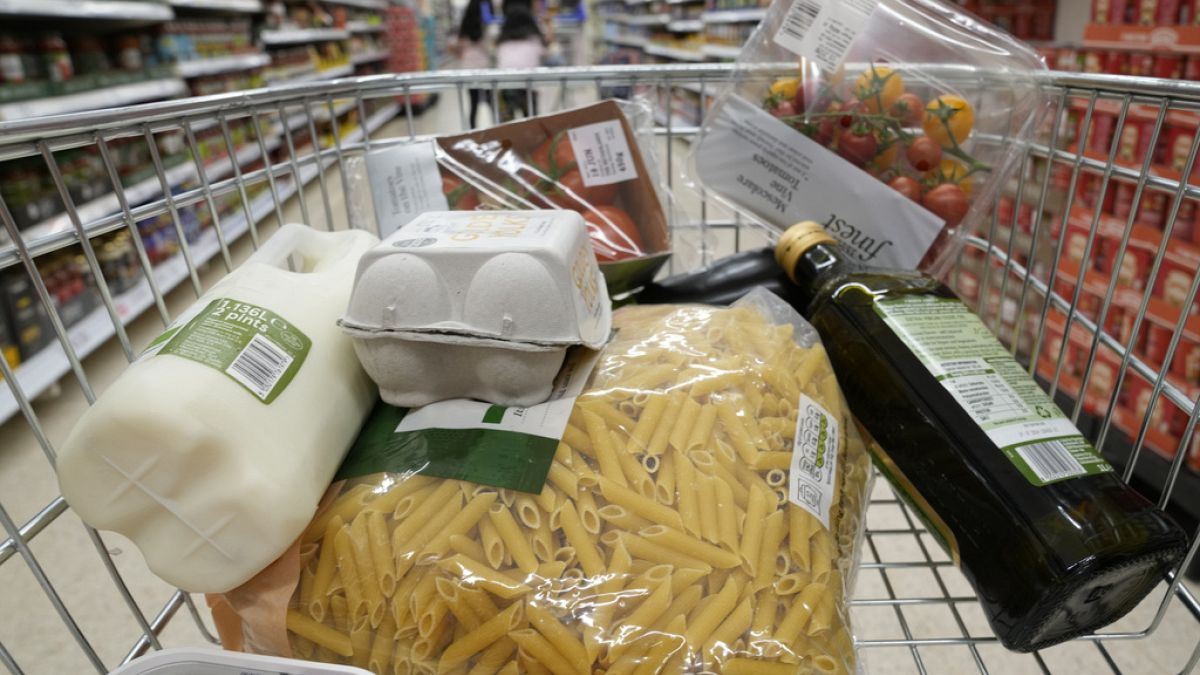Stabilising food inflation and falling house prices both contributed to UK inflation coming down further in March, leading to renewed hopes that the Bank of England might cut rates soon.
The UK year-on-year inflation report for March 2024 came out on Wednesday morning, clocking in at 3.2%, according to the Office for National Statistics (ONS), marking a decline from February’s 3.4%.
However, it was still above analyst estimates of 3.1%, although the lowest number since September 2021.
Food inflation slowing down was one of the biggest contributors to the decline, coming down to 4% from 5% in the previous month.
Regarding food and non-alcoholic beverages prices, the ONS said: “Prices have been relatively high but stable since early summer 2023, rising by less than 2% between May 2023 and March 2024. This compares with a sharp rise of around 22% seen between March 2022 and May 2023.”
Housing expenses also kept falling, albeit at a slightly slower rate, at -1.6% in March, from -1.7% in the previous month.
Hotels and restaurants inflation also inched up at a slower rate, at 5.8% from 6% in February. Similarly, culture and recreation prices grew more slowly in March, coming in at 5.3%, from 5.4% in February.
However, transport costs bounced back, advancing by 0.1% in March, following the four previous months seeing declines. This was mainly due to motor fuel costs looking up slightly as well.
Month-on-month inflation for March clocked in at 0.6%, which was the same as February.
Year-on-year core inflation, which does not take food and energy prices into account due to their inherent volatility, came in at 4.2%, which was the lowest number since December 2021. However, this was also a little higher than analyst expectations of 4.1%.
Could cooling UK inflation persuade the BoE to cut rates?
March’s considerably upbeat inflation report has led to more speculation about whether the Bank of England (BoE) might potentially come under more pressure to cut rates soon, if inflation continues on this downward trend.
Danni Hewson, head of financial analysis at AJ Bell, said in an email note: “Inflation is moving in the right direction and anyone who has wheeled a trolly around a supermarket over the past few weeks will have noticed that prices aren’t delivering those checkout shocks in the same way they were this time last year.
“Next month should look even better as the falling energy price cap is finally counted in the numbers, even if many households won’t have noticed much difference to their outgoings as their direct debits remain elevated to pay off outstanding balances.
“But even in this set of figures there are a few troubling issues, notably the stickiness of service sector inflation. This could be exacerbated by the increase in the National Living Wage which is putting pressure on many businesses to hike prices again to balance their books.
“This print is unlikely to persuade Bank of England policy makers, who just a couple of months ago were voting for further hikes, that the time is now right to start to cut. Andrew Bailey might be making positive noises about the pieces of the economic puzzle falling into place for a change in policy, but markets are far from convinced.
“Looking at the numbers after the inflation print was released, expectation of a June cut has fallen back significantly and more than 50% now think even August will be too soon.”
Nick Rees, forex market analyst at Monex, also commented on the figures and said in an email note: “While headline inflation continued its downward trend in March, a smaller than expected fall reconfirms the message from yesterday’s pay data, suggesting that the BoE should wait until August to begin cutting rates.
“Granted, the small upside misses to both inflation and wage data this week are unlikely to produce significant forecast revisions in next month’s monetary policy report. But the broad signs of stickier than expected inflation visible across all of this week’s data so far warrants a degree of caution from the MPC, and likely a somewhat more hawkish tone from policymakers than was seen in March."



